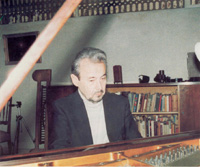PERSIAN MUSIC COMMUNITY IS MOURNING ...
A Tribute to the late Prof. E. Melik-Aslanian
By Pejman Akbarzadeh
[Persian Heritage Magazine (USA), Vol. 8, No. 31, Fall 2003]
[Tehran --] Emanuel Melik-Aslanian, the great pianist and composer, passed away on July 14 at the age of 88.
 Having taught for many years at the Tehran Conservatory of Music and having trained successful pianists on the international podium, such as Pari Barkeshly and Farshad Sanjari, and having composed attractive works inspired by Persian folk and classical music, Melik-Aslanian had a prominent role in advancing Persian art music.
Having taught for many years at the Tehran Conservatory of Music and having trained successful pianists on the international podium, such as Pari Barkeshly and Farshad Sanjari, and having composed attractive works inspired by Persian folk and classical music, Melik-Aslanian had a prominent role in advancing Persian art music.
Unfortunately, not only are none of his works available, but his orchestral scores--which are so valuable for researchers, young composers and lovers of Persian polyphonic music--have never been published. Only a few articles exist which were published many years ago in Tehran in "Music Magazine," and a collection of piano pieces entitled, "Tre Pezzi di Pianoforte su Temi di Danze Popolari Orientali," which was published in Italy in 1990. The cause of this may be traced back to the professor's scruples about the performance of his compositions. I myself often suggested to Professor Aslanian to send his orchestral scores to Manuchehr Sahbai (Persian conductor in Switzerland who is engaged in recording such works), but he refused. He believed only in the technique of Farhad Meshkat, the greatest conductor in the history of Western art music in Persia (Iran), who immigrated to the United States after the 1979 revolution, and in the years that
followed did not have any orchestra to conduct.
Melik-Aslanian was born in 1915 in a Christian family in Tabriz and received his first piano lessons by a local musician called Sufia Amatoni. In 1927, he began to study piano at the Brahms Academy in Hamburg; and from 1935 to 1937 he continued his studies at the Hamburg Conservatory. He studied composition and conducting at the German State Academy and spent a few years studying philosophy. The teachers who exerted the strongest influence on him were P. Hindemith, C. and J. Ansorge. After graduation he became the director of a piano school in Hamburg and performed many recitals in Germany and Austria which attracted the attention of music critics.
Upon his return to Persia (Iran) in 1952 he was appointed professor at the Tehran Conservatory. A few years later he started to collaborate with Radio Tehran's Western classical music programs and the Opera Council of the capital. In this period, Melik-Aslanian paid greater attention to Persian (Iranian) music and composed several works for the piano such as "Tchargaah," inspired by the music of his homeland. His other works [e.g., Golbang Symphonic Poem, Parvaneh (Butterfly) Ballet, Piano Concerto, Ballet of the Tales of Creation, etc.] were performed by the Tehran Symphony and Tehran Conservatory Orchestra.
Aslanian believed that if one added "counterpoint" to our national music heritage and created new methods for arrangement of Persian melodies, we would be able to create an international school. He always said, "Counterpoint is a science, and thus it is international; therefore, it would not damage our national identity."
Biblography (in Persian):
- Abbassi, Saeed. "An Interview with Emanuel Melik-Aslanian," Kelk Magazine, Nos. 58 & 59. January & February 1994.
- "A Journey to the Infinite" (an Interview with Prof. Melik Aslanian). Hamshahri daily, No. 872, January 1, 1994.
- Akbarzadeh, Pejman. "Persian Musicians" (Vol.1). Navid Publications, Shiraz/Tehran, 2000.
- Parissa. "In Search of International Style; An Interview with Emanuel Melik-Aslanian". Roudaki Monthly, No. 36, October 1974.
- Saba, Hossein. "Emanuel Melik-Aslanian". Iran's Music Magazine, Vol. 3, No. 8, January 1955.
